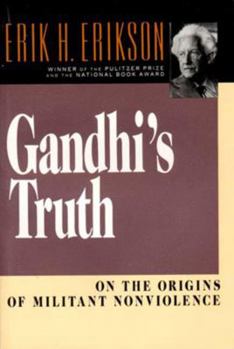Gandhi's Truth: On the Origins of Militant Nonviolence
Select Format
Select Condition 
Book Overview
In this study of Mahatma Gandhi, psychoanalyst Erik H. Erikson explores how Gandhi succeeded in mobilizing the Indian people both spiritually and politically as he became the revolutionary innovator... This description may be from another edition of this product.
Format:Paperback
Language:English
ISBN:0393310345
ISBN13:9780393310344
Release Date:April 1993
Publisher:W. W. Norton & Company
Length:476 Pages
Weight:1.01 lbs.
Dimensions:1.4" x 5.5" x 8.5"
Customer Reviews
3 ratings
Pscyho-history but not psycho-babble
Published by Thriftbooks.com User , 15 years ago
As a young lawyer working on Civil Rights matters in New York and in Mississippi during the 1960's, we often discussed Martin Luther King's and Ghandi's approaches to achieving our objectives. One passage from Ghandi's autobiography came up several times, primarily to be rejected -- black people had certainly proved their worth in both World Wars, but racial distinctions had not become a thing of the past: "If I could make my countrymen retrace their steps, I would make them withdraw all the Congress resolutions, and not whisper "Home Rule" or " Responsible Government " during the pendency of the War. I would make India offer all her ablebodied sons as a sacrifice to the Empire at its critical moment; and I know that India by this very act would become the most favoured partner in the Empire and racial distinctions would become a thing of the past." 1916 Erik H. Erikson was struck by the difference between Ghandi's views in 1916 and his actions two years later: "For mark the year: it was on the Ides of March of 1918, the year of massive mechanized slaughter on the front in France, the year when empires collapsed and new world alliances were formed, the year of Wilson and above all of Lenin. And here in Ahmedabad one of the great charismatic figures of the postwar world was concentrating on a strictly local labor dispute, putting his very life on the line by fasting -- an event scarecely noticed even in India at the time. That Mr. M. K. Gandhi chose to fast as part of a new method of civic and political leadership meant as yet nothing to anyone but a few friends, andthe immediate consequence did not call for national or world attention.... I became fascinated with those months in Gandhi's middle years. I decided to reconstruct what in this book we will call the Event as a focus for some extensive reflections on the origins, in Gandhi's early life and work, of the method he came to call 'truth force'." Erikson describes his book as a psycoanalyst's search for Gandhi and the meaning of what Gandhi called "Truth". Erikson describes his and his friends's initial involvement with Gandhi given his clinical training. Erikson spends a chapter describing how Gandhi made the Event "his own" in his autobiography, something that occurs whenever a person witnesses and records an event, even if it involve the writer is a key player in the event. Ghandi recognized that his social experiments began in his youth, and Erikson spends a great deal of time reviewing with "a mixture of clinical and historical hindsight why what led up to the Event had to happen the way it did." Finally, Erikson reviews the Event in great detail against that hindsight, arguing that that the Event was not a minor affair, but fundamental "to the fact that Gandhi was to emerge exactly a year later as the leader of the first nationwide act of civil disobedience." I was initially concerned that Erikson's approach would constitute psycho-babble, not psycho-history, but in the event E
psychological perspective
Published by Thriftbooks.com User , 22 years ago
you might want to read this book for his concept of psychosocial development of stages. but if you want to know about Gandhi, go find a different book.
This text reviews the historical presence of Gandhi in India
Published by Thriftbooks.com User , 24 years ago
I found this book very interesting, as well as culturally diverse. It gave me a whole new perspective into a world much different from my own. I learned that Mahatma Gandhi has profoundly influenced leaders that have been involved in nonvoilent liberation movements, such as Rev. Martin Luther King, Jr.. I now have a deep admiration for this abstruse, insightful man because Gandhi beleived that truth is always essential in the political arena. "Gandhi's Truth" is an introduction to the challenges of poverty, religious difference, and ethnic tensions we all must accept and try to deal with as we head into the everchanging 21st century. I strongly recommend this book to anyone involved in or wishing to study politics. Happy Reading!






